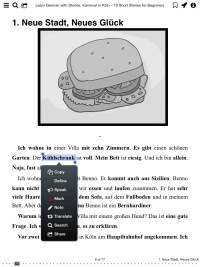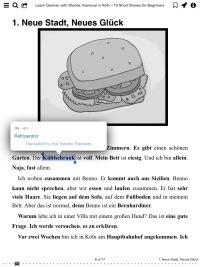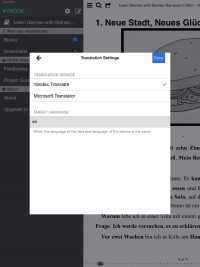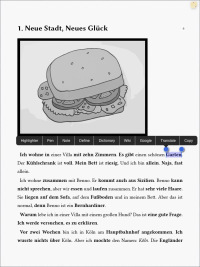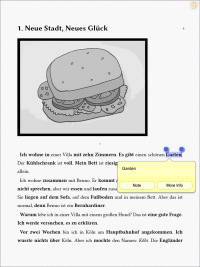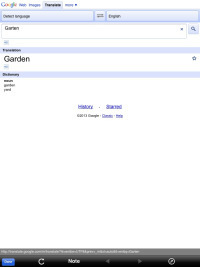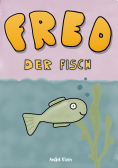André Klein's Blog, page 16
June 5, 2014
How German Detective Series Can Spice Up Your Language Learning Journey

by olarte.ollie via Flickr
Germans just love their Krimis (crime fiction), whether in paperback format or on the silver screen. One of the most famous German detective series on TV is probably Tatort which has been serving fresh murder mysteries since 1970 and still captivates millions of viewers each Sunday evening.
Today, I’d like to talk a bit about how detective series can be a great language learning tool, especially when it comes to reading German Krimis. For the more auditory and visually inclined, skip to the end of this article to find links to German detective series.
Dial “D” for Dialogue
One of the great aspects of the crime fiction genre is that you’re bound to have a lot of dialogue. Witnesses have to be convinced to speak out, suspects need to be interrogated, and then there’s the ongoing banter between the detectives.
If you’re tired of repeating out of context sentences in Duolingo or from your textbook, German detective stories will provide you with tons of authentic dialogue full of colloquialisms and idiomatic expressions.
This more natural language can sometimes be tricky to grasp at first, but while grappling with it you’re learning how people actually speak.
Describe it in Deutsch
Furthermore, each Krimi will contain descriptions of people, objects and places. Depending on the author and date of publication, these descriptions will often be just rich enough to convey an atmosphere and important information, but not too literary as to get lost in them.
Whereas other genres may contain a lot of descriptions as well, with crime fiction you actually have to pay attention, lest you miss that important connection or clue which is key to understanding the whole murder mystery.
Keep Those Pages Turning
Last but not least, a good detective story (whether in writing or on screen) will keep you at the edge of your seat. Let’s face it, learning a language is hard, so any incentive you can get is heaven-sent.
Naturally, you’ll need some basics before you can delve into a German detective series, but as soon as you understand enough to get hooked, you can use the “What will happen next?” effect to help you continue when the going gets rough.
In other words, some vocabulary will be completely mind-boggling, some sentence constructions will seem like from a different planet, but as long as you’re burning with curiosity as to how it will all turn out, you can pull through even the most difficult parts.
How to Get Started With German Detective Series
As mentioned above, the crime fiction genre is very popular in Germany, so you’ll find many detective series on German TV. And you don’t even have to live in Germany, since many of them are also available as video-on-demand, free of charge.
Television and Video-on-Demand
The Tatort series is broadcast every Sunday evening at 20:15 CET. You can either follow the live-broadcast or watch the video which is available for seven days after the initial broadcast in the ARD Mediathek. The second most popular German detective series in terms of rankings is “Polizeiruf 110“, which is also available either live or on the Mediathek.
Additionally, there are a range of Krimis on ZDF like “Ein fall für zwei”, Ein starkes Team”, “Bella Block”, etc. which you can find through the ZDF Mediathek. Note: If a video has the icon “UT” that means you can get German subtitles (Untertitel) while watching.
Novels and Detective Stories For Learners
If you’re looking for a German mystery to read during your holidays or on your commute, there are a number of places to get started. First of all, I’d recommend to take a look at Friedrich Dürrenmats “Der Richter und sein Henker” which is not only a classic but also ranks on top of the Krimi Forum’s top 100 German crime fiction novels.
Another good starting point is to look at the Amazon bestseller list of the genre or this this reader-curated list of best german detective novels.
If these books still prove too difficult for your language learning level, you can also check out my Baumgartner & Momsen detective series for intermediate (~B-C) German learners which is specifically designed with students in mind and contains a lot of vocabulary, expressions and even a few text-comprehension questions to check yourself as you go along.
These books are available as paperback editions and ebook editions for Kindle, Nook, Kobo and a dozen other formats.
-
img: Some rights reserved by olarte.ollie

 About the author:
André Klein was born in Germany, has grown up and lived in many different places including Thailand, Sweden and Israel. He has produced two music albums, performed and organized literary readings, curated an experimental television program and is the author of various short stories and non-fiction works.
About the author:
André Klein was born in Germany, has grown up and lived in many different places including Thailand, Sweden and Israel. He has produced two music albums, performed and organized literary readings, curated an experimental television program and is the author of various short stories and non-fiction works.
The post How German Detective Series Can Spice Up Your Language Learning Journey appeared first on Learn Out Live!.





May 29, 2014
Calling All Independent Teachers (Vol.2): A Clean and Well-Lighted Community Space

About two years ago I wrote a post with the title “A Call to All Independent Teachers“. It was to announce the free online teachers and tutors directory here on LearnOutLive.
The idea behind this directory was to create a space where independent education professionals can list their website in order to attract students and gain the attention of other teachers.
Many teachers have joined the directory since then. Almost every day new teachers are signing up, and I continue to be amazed by how many people have made teaching online their part-time job or full-time profession.
Connecting Independent Online Teachers
Having been a non-institutional teacher myself for almost a decade (and later an online language teacher), I know how rewarding it can be to work directly with people and help students to achieve their goals, but also I’ve experienced the many challenges of running an independent online teaching business.
If there’s one thing that has helped me most to succeed in my time as an online language teacher, then it’s probably networking; making contacts with other teachers, learning about their experiences and challenges, exchanging helpful morsels of advice, or just the odd bit of commiseration here and there.
Some of these teachers have become good friends, and although we’ve never met physically, there’s a strong sense that we’ve known each other for years.
This community spirit has not just been “platonic”, either, but has led to many real-world consequences, most notably perhaps the book we co-authored together in 2013, involving 10 people from 5 different continents!
An Avalanche Of Fleeting Newsfeeds
Most of these connections between us have been through email, instant messages and comments throughout the Social Media world. The great thing about using tools like Facebook and Twitter is the immediacy. If I have a question about something or need feedback about a project I’m working on, all I need to do is ask, and immediately my colleagues will be able to see my question and respond to it.
While this form of exchange allows us to get results very easily and instantly, these moments are also very fleeting. What you post on Facebook or Twitter today, is basically gone tomorrow. So, if one of my colleagues has the same question in two weeks, chances are she’ll have to ask it again. Plus, there’s always the danger of posts getting lost in the constant noise of newspaper articles, cat photos and wedding invitations.
Building a More Permanent Space
Over the last few weeks I’ve been thinking about ways to make the communication between independent online teachers and educators less evanescent. What I’ve come up with is an approach which is as old as the Internet itself: yep, forums. A good forum can be a place away from the noise, where serious discussion takes place, and it can also act as a knowledge-base or archive for future questions and discussion. For example, I can’t tell you how many times I’ve found an answer to a programming-related question by going to Google and reading though forum threads.
So, without further ado, I present to you: The LearnOutLive Teachers Forum.
If you’re an independent online teacher looking for a place where you can share your knowledge and experience with others, learn about educational tools, methods and websites, or just to hang out in your coffee breaks, you’re most welcome to join!
P.S.: This forum might be a bit different than other forums you have used before, because it utilizes the Muut Framework. Not only did I appreciate the absolutely blazing performance, minimal design and deep customizability, also their philosophy seemed somewhat compatible with what we’re trying to do here.
-
photo: Some rights reserved by CaptPiper

 About the author:
André Klein was born in Germany, has grown up and lived in many different places including Thailand, Sweden and Israel. He has produced two music albums, performed and organized literary readings, curated an experimental television program and is the author of various short stories and non-fiction works.
About the author:
André Klein was born in Germany, has grown up and lived in many different places including Thailand, Sweden and Israel. He has produced two music albums, performed and organized literary readings, curated an experimental television program and is the author of various short stories and non-fiction works.
The post Calling All Independent Teachers (Vol.2): A Clean and Well-Lighted Community Space appeared first on Learn Out Live!.





May 19, 2014
Café in Berlin Review for German Learners by Herr Antrim: “Really Easy to Read!”
A few weeks ago we offered language bloggers and YouTubers around the world to choose any book from our library and we’d send it to them, free of charge. Today, I was pleasantly surprised to see that German teacher Levi Antrim (perhaps better known as Herr Antrim) put together a little book video review for the “Café in Berlin” book for German learners we sent out to him.
Levi does a great job of helping German learners with creative videos full of imaginative puppeteering, singing and dancing, unlike anything you’ve ever seen before in high school or any old mind-numbing Deutsch class.
You can find Herr Antrim on Twitter, Facebook, Google+, on his school website and of course on YouTube. If you haven’t followed, liked or subscribed to Herr Antrim yet, do it now!

 About the author:
André Klein was born in Germany, has grown up and lived in many different places including Thailand, Sweden and Israel. He has produced two music albums, performed and organized literary readings, curated an experimental television program and is the author of various short stories and non-fiction works.
About the author:
André Klein was born in Germany, has grown up and lived in many different places including Thailand, Sweden and Israel. He has produced two music albums, performed and organized literary readings, curated an experimental television program and is the author of various short stories and non-fiction works.
The post Café in Berlin Review for German Learners by Herr Antrim: “Really Easy to Read!” appeared first on Learn Out Live!.





May 12, 2014
Diane Gantenhammer: I am fortunate to say that my dream has come true.
The following interview is part of an interview series in which we feature education professionals from a variety of different fields in order to highlight individual efforts and creative solutions to education in the 21st century. If you want to participate simply write down and send your answers to the five below questions to info {at} learnoutlive.com and include a picture of yourself. (Please note that we reserve the right to not publish all submissions)
1
 . Who are you and what do you do in education?
. Who are you and what do you do in education?My name is Diane, and I am the Founder of teacherdiane.com, a website providing personalized English lessons on Skype, grammar games, and an English language blog.
After a few years spent teaching English, I launched my website in January of 2013, with the almost idealistic dream of being able to travel the world and teach English online. I am fortunate to say that my dream has come true.
In my first year alone, I helped over forty students improve their English, and I have developed enough lesson plans to last an average teacher a lifetime.
As I approach my five-year anniversary of teaching English, I am proud to say that I have taught students from over 25 different countries. Although at times my eyes may be blurry, and my nighttime dreams full of English grammar, it has all been worth it.
Teacherdiane.com offers personalized English lessons on Skype and an Intermediate Skype Course. Based on my knowledge and experience, I have developed a method of learning English that I truly believe in– a method of easily explaining grammar concepts and offering students an opportunity to practice each grammar topic in a practical way, with writing, listening and speaking opportunities.
2. Describe a typical workday in your life!
Since launching my business, I have taken full advantage of my location independence. The past couple of years I have spent living in different locations throughout the world. I’ve spent some time in South America, I am currently in Asia, and I am planning to head to Europe in a few months.
One of the best parts of my job is that no day is typical for me. Most of the day is spent working, but the time when I’m not working is spent exploring my local surroundings or doing something active.
One day I am an English teacher, another day I’m an editor, a SEO marketer, a web developer, a video animator, or a guest blogger.
There are some routines that I do follow, though. I typically wake up early and check my email while eating breakfast. I respond to any student inquiries, and update my Facebook page, Twitter feed, and every few days, my English blog.
3. In what way has technology in general and the net in particular changed your work?
Technology and the Internet have changed my work in a huge way. One hundred percent of my work is done with the aid of a computer. From creating English video tutorials to lesson planning, blogging and most importantly giving students English lessons on Skype. I am a very visual teacher, and initially I was hesitant to try giving lessons on Skype, but during my lessons, I use my tablet along with screen sharing technology to make students really feel like they are in a classroom.
Twenty years ago if someone had told me that my future job would involve speaking with people from all over the world each day, but from the comfort of my own home, I would have told them that they were crazy.
4. What challenges do you see for education in the future?
Over the past few years, so many new possibilities for learning have emerged, from free online courses, to educational video games and interactive activities with iPads integrated into classroom learning. Access to so much information is at our fingertips (assuming that you have access to a computer and Internet).
But will these new resources be as effective as a good old traditional classroom education? Will these new resources be able to keep up with the increasingly shortened attention spans of learners? Some researchers say that a typical student’s attention span is about 7-10 minutes long. How can a student find motivation to learn in a world with so many distractions?
I can only hope that the information and resources we have available are used effectively in the future. And that we can find new ways to make learning fun!
5. Where can we find you online?
Website: teacherdiane.com
Blog: teacherdiane.com/blog
Facebook: teacherdianeESL
Twitter: teacherdianeESL
YouTube: teacherdianeESL
-

 About the author:
LearnOutLive Interviews is an interview series in which we feature private teachers and education professionals from a variety of different fields in order to highlight individual efforts and creative solutions to education in the 21st century. If you want to participate simply write down and send your answers to these five questions to info {at} learnoutlive.com and include a picture of yourself. (Please note that we reserve the right to not publish all submissions)
About the author:
LearnOutLive Interviews is an interview series in which we feature private teachers and education professionals from a variety of different fields in order to highlight individual efforts and creative solutions to education in the 21st century. If you want to participate simply write down and send your answers to these five questions to info {at} learnoutlive.com and include a picture of yourself. (Please note that we reserve the right to not publish all submissions)
The post Diane Gantenhammer: I am fortunate to say that my dream has come true. appeared first on Learn Out Live!.





May 7, 2014
14 Twitter Feeds For German Learners

Twitter is infamous for being a procrastination device, but it’s actually a great tool for learning languages. No, really! Learning German with ancient grammar tomes is all fine and dandy, but there’s nothing like getting daily mini-doses of vocabulary, idioms and other learning materials sent right onto your smartphone or tablet. Here are a few twitter feeds (with selected tweets) that we think might be helpful for German learners:
Was passt in die Lücke?
Anstatt ___, bin ich extrem schlecht gelaunt.
a) ich bin zufrieden b) zufrieden zu sein c) dass ich zufrieden bin
— DW – Learn German (@dw_learngerman) 7. Mai 2014
This is the twitter feed by Germany’s international broadcaster “Deutsche Welle” and their amazing (free) German learning program. A must-follow for all learners!
Bavarian Dialect #pechakucha http://t.co/1qrUy67XOF #German?
— UW German (@uwgerman) 28. März 2014
The Department of Germanics at the University of Washington’s twitter feed is a great place for learning about German culture, society, arts and history.
Oh, you green nine!
Ach du grüne Neune!
Good grief! / Oh, dear!
— German Quatsch (@GermanQuatsch) 5. Mai 2014
Very amusing feed full of German words and sayings with their literal translation.
das Vorstellungsgespraech = interview
das Arbeitspraktikum = work experience
die Erfahrung = experience
der Lebenslauf = cv
— Bablake German (@BablakeGerman) 5. Mai 2014
Follow the twitter feed of the Bablake German Department to get links to resources and vocabulary (with English translation) in tweet-sized bites.
Endlich mal eine Wohnung, in die der Makler nicht mit einzieht! pic.twitter.com/7ukpt5j6UN
— Juliane Topka (@Sprachpingel) 7. Mai 2014
Not specificially targeted at language learners, this twitter feed by Juliane Topka shares funny mistakes and misunderstandings in German.
Wie bilde ich das Datum auf Deutsch? http://t.co/s2ulyuchjr
— Kirsten Winkler (@DeutschHappen) 31. März 2014
On the official twitter feed of Kirsten Winkler’s Deutsch Happen project, you’ll find German recipes, links to videos, articles and more about German culture, language and general study tips.
This twitter account by the German Department of St. Mary’s College in Dublin shares helpful tips, translations and exercises from around the Twitterverse.
das Niveau =level /standard /quality #DailyDeutsch #German
— Colin Silcox (@colinsilcox) 1. Mai 2014
German learner Colin Silcox uses Twitter to share German words and expressions, and links to articles and other resources.
Die Brücke. pic.twitter.com/AersCDOObv
— slowgerman (@slowgerman) 19. April 2014
This is the twitter feed of the “Slow German” podcast, posting daily vocabulary with English translation and an image.
If You're Happy & You Know It auf Deutsch: http://t.co/ATtlEBfLHy The stomping part makes me giggle. Every time. #noshame
— Herr Antrim (@MrLAntrim) 28. April 2014
This is the twitter feed by German teacher and YouTube puppeteer Herr Antrim. Follow for helpful German learning resources and news around Germany and German culture.
'Anfang vom Ende der DDR': Ulrike Poppe recalls East Germany's electoral fraud on 7th May 1989 http://t.co/0w9aVuETmu via @rbbinforadio
— German at Portsmouth (@GermanAtPompey) 7. Mai 2014
Follow the twitter feed of the German study program by the University of Portsmouth to find daily articles and other links about Germany, German culture, history and language from around the web.
Wort des Tages: DE: der Feierabend / EN: time when you finish work (lit. "party evening")/ Bsp.: Wann hast du Feierabend? -Um 16.30 Uhr.
— German at Hallam (@GermanAtHallam) 7. Mai 2014
In this twitter feed of the German study program at Sheffield Hallam University you’ll find a daily “Wort des Tages” with English translation and example, and other funny and/or helpful tweets around learning German.
Sie lernt ___ die Prüfung.
a) an
b) von
c) um
d) für
#Deutschlernen
— DeutschAkademie (@deutschakademie) 29. April 2014
This is the official Twitter account of the Deutschakademie, tweeting daily German learning exercises (and solutions). Very good way to get some daily practice.
unter dem Ladentisch – under the counter #dailydeutsch
— LearnOutLive German (@_learn_german) 4. Mai 2014
Last, but not least, this is our own twitter feed for German learners on which we post articles about German learning from this blog, daily vocabulary, idioms and much more.
This was just a small selection! There are many great Twitter feeds for German learners. Which ones do you find helpful in your studies? Tell us in the comments!
-
icons in image: by Killian McIlroy from the Noun Project CC BY 3.0

 About the author:
André Klein was born in Germany, has grown up and lived in many different places including Thailand, Sweden and Israel. He has produced two music albums, performed and organized literary readings, curated an experimental television program and is the author of various short stories and non-fiction works.
About the author:
André Klein was born in Germany, has grown up and lived in many different places including Thailand, Sweden and Israel. He has produced two music albums, performed and organized literary readings, curated an experimental television program and is the author of various short stories and non-fiction works.
The post 14 Twitter Feeds For German Learners appeared first on Learn Out Live!.





April 28, 2014
Best Ebook Reader Apps With Word Translation For iPad and iPhone (iOS)
Ebooks and ereading technology is everywhere these days. According to this survey, a whopping 86% “of the top 2,500 genre fiction bestsellers” sold on Amazon in 2013 were ebooks. In other words, ebooks are doing great, whether on iPad and Phone ebook apps or dedicated readers such as the Kindle or Kobo.
As an author of German language learning stories I always recommend to turn on instant translation features on tablets or ebook readers so that students can learn new words without leaving the text. Simply tap/click a word and read on! What sounds like such a simple feature, can often be curiously hard to find on even the most modern devices and apps.
For example, Apple’s official ereading app iBooks on iPhone and iPad does offer definitions when tapping on a word, but only in one language, i.e. you can get the English definition for the English word ferruginous or the German definition of the German word eisenhaltig, but not vice versa.
3 Ebook Reader Apps That Let You Tap & Translate Foreign Words Into Your Own Language
Today, I’d like to present a few ebook reading apps that allow you to tap and translate foreign words on your iPhone and iPad. These apps are certainly not the only iOS ebook reader apps with translation features, but they are the best ones I could find that are both free and useful.
Kybook Reader (iOS)
The first app I’d like to show you is the beautiful Kybook Reader. It comes with a sleek and modern user interface, some very interesting features for language learners, and best of all, it’s free!
Once you have installed Kybook Reader on your iPad or iPhone, you can open any EPUB files directly from the web browser, email attachments and cloud storage. Or, just browse free Gutenberg books or download reading material directly from Feedbooks.
After opening a book, you can tap a word and you get a context menu containing a number of option, among them Translate. Tap Translate and you’ll get the translation in a little bubble:
Translations are provided via Yandex or Microsoft. Language translation settings can be changed by going to Menu > Settings (gear icon) > Translation.
All in all, Kybook Reader is a great app for language learners. It’s beautiful, directly hooks into popular free resources for foreign language books and offers word translation. The only thing that it doesn’t do is offline translation, i.e. the translation feature requires an online connection because it makes request to the Yandex or Microsoft server.
NeoSoar eBooks, PDF & ePub reader (iOS)
Next up, we have another free ebook reader for iPad and iPhone called NeoSoar. Its userface looks a bit dated with the wooden photo background and shelf aesthetic, but I guess it’s a matter of taste.
After installing the NeoSoar app on your iOS device, you can open any PDF or EPUB files from anywhere on your iPad or iPhone. Simply open your book and tap a word. From the context menu, select Translation and you’ll get a little popup containing the word translation.
There aren’t too many options here, but if you tap More Info in the translation popup, you can get some more details via Google Translate.
While NeoSoar seems like a solid enough ebook reader app for iOS, it seemed to have problems with parts of my ebook’s formatting and although it didn’t completely break the formatting, it also didn’t interpret it as faithfully as Kybook, Adobe Reader or iBooks.
Also, if you’re regularly reading far from a internet connection, keep in mind that NeoSoar’s translation feature will only work when connected to the internet, since it uses Google Translate.
3. Kindle (iOS)
Last but not least, let’s talk about the Amazon Kindle app for iPhone and iPad. Most people know this app, but not many are aware of its word translation feature for foreign language books. Getting a custom dictionary installed may require a bit of effort (see tutorial linked below), but also you’ll get full offline functionality!
Once you’ve installed (or purchased) a dictionary, simply tap a word and you’ll see the translation. No need to tap twice or follow through menus. By tapping on the language (in the above example Deutsch) you can select different dictionaries, if available.
Once can argue about looks and design, but the best feature of the Kindle ebook reader app for iOS is that the word translation feature works offline, no connection required!
To find out more about how to install foreign language dictionaries on the Amazon Kindle app for iPad and iPhone, see here.
-
img: rights belong to the respective owners

 About the author:
André Klein was born in Germany, has grown up and lived in many different places including Thailand, Sweden and Israel. He has produced two music albums, performed and organized literary readings, curated an experimental television program and is the author of various short stories and non-fiction works.
About the author:
André Klein was born in Germany, has grown up and lived in many different places including Thailand, Sweden and Israel. He has produced two music albums, performed and organized literary readings, curated an experimental television program and is the author of various short stories and non-fiction works.
The post Best Ebook Reader Apps With Word Translation For iPad and iPhone (iOS) appeared first on Learn Out Live!.





April 22, 2014
24 Techniques to Learn English Faster, According to Your Learning Style

Some people have a natural knack for learning languages, but for others learning a new language can be a daunting task.
The best way to learn a new language varies depending on your particular learning style.
Students are typically taught using a combination of the three learning styles, but they usually have a strong preference for one. It’s important to know which learning style is best for you.
The three main types of learning styles are auditory, visual, and kinesthetic.
Auditory learners depend on hearing and speaking as their main method of learning. To easily understand, auditory learners must be able to hear what is being said, as these learners may find it more difficult to understand instructions that are written.
 Auditory learners can try the following techniques to learn English:
Auditory learners can try the following techniques to learn English:
Listen to English language podcasts. There are tons of free English podcasts on the Internet. Make a habit of listening to a podcast for a few minutes each day.
Listen to books on tape whenever you can (as you drive to work each morning, or while you exercise at the gym).
Record classroom lectures and listen to them again in your spare time.
Repeat information aloud or silently in your mind as you are taking notes in class.
Recite information aloud to study. Find a quiet place or a place with light music playing in the background to practice reciting English words aloud.
Listen to music, read the lyrics and sing along!
Watch movies and television shows in English with English subtitles. Listening to English and seeing the English words written on the screen will help you to better remember the word in the future.
Speak with a native speaker or participate in a language exchange.
Use rhymes or jingles to help you remember important points.
Visual learners learn best by looking at charts or graphic organizers, watching a demonstration or reading.
Visual learners can try the following techniques to learn English:
Highlight important information as you read—color-coding your notes can help greatly. Underline or circle new words and phrases.
Keep a notebook or create flashcards to write down new vocabulary words. Translate the word into your native language; write the definition in English along with a sample sentence. Dictionaries often provide good example sentences along with definitions.
Separate new vocabulary words into different groups.
Create your own sentences using new vocabulary words—the next time you see the word, your brain will associate that word with the sentence you created.
When reading an article, try to understand the big picture first, and then focus on the details.
Watch English video tutorials where teachers use visuals (e.g. charts, formulas, cartoon images etc…) to explain grammar points.
Watch movies and television shows in English with English subtitles.
Buy a grammar workbook online to practice on your own.
Kinesthetic learners process information best with a “hands-on” experience. They like to learn by doing. Research has found that while learning, it helps if kinesthetic learners move around.
Kinesthetic learners can try the following techniques to learn English:
Create flashcards, but do not use a computer. Writing things down yourself helps to put new information in your long-term memory.
Play games (online or in-person) to practice grammar points. Invite some friends, and make it more competitive!
Practice role-playing activities with a friend.
Study in short blocks—take a ten-minute break every twenty minutes to move around and recharge.
Create motions associated with words. Using your body to express a thought, idea or concept will help you to remember it.
Travel to an English-speaking country and experience the English language first-hand.
Speak with a native speaker or participate in a language exchange. If you can’t find a native speaker in your town, try speaking with a native English teacher on Skype.
Whether you’re an auditory, visual or kinesthetic learner, there are many different ways to include English learning in your everyday life. If you take just a few minutes each day to practice some of these techniques, you’re sure to see improvement!
You’ve been reading a guest post by Teacher Diane

Diane is an English teacher from New York with over four years of experience teaching English to students from all over the world. She is the Founder of teacherdiane.com, a website that provides personalized English lessons on Skype. You can watch her English video tutorials, or follow her on Facebook.
photography: Sunova Surfboards (CC) via Flickr, clipart via clker.com

 About the author:
Teacher Diane is an English teacher from New York with over four years of experience teaching English to students from all over the world. She is the Founder of teacherdiane.com, a website that provides personalized English lessons on Skype. You can watch her English video tutorials, or follow her on Facebook.
About the author:
Teacher Diane is an English teacher from New York with over four years of experience teaching English to students from all over the world. She is the Founder of teacherdiane.com, a website that provides personalized English lessons on Skype. You can watch her English video tutorials, or follow her on Facebook.
The post 24 Techniques to Learn English Faster, According to Your Learning Style appeared first on Learn Out Live!.





April 16, 2014
The Great Free Book Giveaway For Language Bloggers and Youtubers

Over the course of the last four years, we’ve published dozens of different (language learning) books through LearnOutlive, both big and small, in paperback and digital formats.
We did all of this independently, without investor capital, big publishing houses or secret handshakes. Instead of hammering out contracts and trying to gain favors from the “industry”, we focused on one thing and one thing only: making books that people love.
It’s not for me to say if it’s always working, but from the many readers’ emails that we receive almost every day, it seems we’re also not doing everything wrong.
Calling All Independent Language Learning Teachers
Today, I’d like to reach out to all the independent language bloggers and YouTubers out there who have made it their commitment to produce helpful articles and videos for language learners. You might not be the BBC or a million-dollar language learning start-up, but that’s why people share your articles and watch your tutorials. They feel you’re one of them. Because what are highly branded, commercialized info-packages against some advice from a good friend?
“What’s this about?”
As a tip of the hat to the independent language learning community worldwide, we are doing a free book giveaway for the next two weeks. In short, you can pick any book from our language learning section, and we’ll send it you, as an ebook or paperback, free of charge.
“Who is eligible?”
If you’re regularly producing high-quality content (videos, articles, etc.) for language learners and you aren’t formally tied to an institution or company, you can request your free copy below until the 30th of April.
“What do you want in return?”
Nothing, actually. If you loved the book and you feel like writing about it or doing a short video, that would be super awesome! If not, also fine.
“How does it work?”
Fill in the form below and tell us which of our books you’d like to receive. (Don’t forget to add your postal address if you want a physical paperback copy.) We’ll get back to you as soon as possible.
[contact-form]
Please note that we reserve the right not to respond to all queries.

 About the author:
André Klein was born in Germany, has grown up and lived in many different places including Thailand, Sweden and Israel. He has produced two music albums, performed and organized literary readings, curated an experimental television program and is the author of various short stories and non-fiction works.
About the author:
André Klein was born in Germany, has grown up and lived in many different places including Thailand, Sweden and Israel. He has produced two music albums, performed and organized literary readings, curated an experimental television program and is the author of various short stories and non-fiction works.
The post The Great Free Book Giveaway For Language Bloggers and Youtubers appeared first on Learn Out Live!.





April 9, 2014
Free German Children’s Books For Language Learners Young and Old

Learning German with stories is a great method to practice and expand your vocabulary and grammar. But where to start? Literary German short stories or classic German novels may be intimidating for beginners or simply not everyone’s cup of tea.
So how about German children’s books? The sentences are short, there are often illustrations to support text comprehension, and most German books for children make do with a rather basic vocabulary.
Admittedly, most stories aimed at third-graders will not put adult readers at the edge of their seat, but working with these very simple narrative text can be an excellent way to practice German in a non-threatening way.
In the following article, I’d like to present a number of German language books for children that come in various formats, but most importantly, are free to download and enjoy.
Free Classic German Children’s Books From The Public Domain
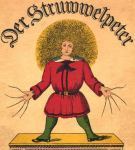 One of the most well-known sources for free German children books online is the public domain, .i.e. the place where books (and other works of art) go when their copyright has run out.
One of the most well-known sources for free German children books online is the public domain, .i.e. the place where books (and other works of art) go when their copyright has run out.
For example, the classic German children’s book Der Struwwelpeter, first published in 1845 as a kind of cautionary tale, is available on Project Gutenberg in a number of different formats. Also, the Grimm Brothers’ world-famous collection of fairy-tales can be easily obtained through the Projekt Gutenberg. Even more fairy-tales in German are offered here and here.
At the International Children’s Digital Library, home of more than 4450 books in 44 languages, there are also many German children’s books (not all of them in the public domain but permission has been granted for non-commercial use). The site can be a bit tricky to navigate but if you follow this link, you’ll get the search results for all the German language children’s books.
Now, finding free German children’s books or fairy-tales in the public domain is not difficult, but there’s a problem with books or stories that are more than 100 years old. Not only are the ideas and strict morals (as in Struwwelpeter) bewildering to modern readers, also these texts often use strange vocabulary, idioms and other stylistic devices which are outdated and hard to grasp even for native German speakers.
Free Contemporary German Language Books For Children
Luckily, there are many other sources for free German children’s books than just the public domain:
Hans Wilhelm, a renowned children’s book author whose works have been translated into thirty languages, generously offers out-of-print editions of his books as free PDF downloads. Wilhelm’s books are written in clear and contemporary language, and come with lovely full-color illustrations. Also, since he offers his children’s books in multiple languages, you can read the English and the German editions side by side, which is immensely helpful for reading-comprehension.
Additionally, there are many free German books for children published by federal German agencies, leagues and associations, which are designed as educational material for youngsters but will do just fine for German language-learning purposes.
Free German Books For Children About Environmental Issues
First of all, there’s the Bundesumweltamt (Federal Environment Agency) whose books deal with environmental issues like climate, water and waste-management. To filter out their children’s books from the thousands of publications, select Kinderbuch from the drop-down menu under Reihe and click on Anwenden.
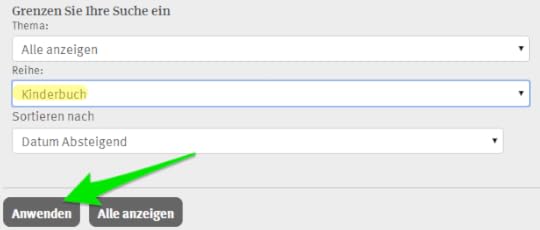
Once you get to the search results for their children’s books, look for the buttons Downloaden und Bestellen under each title. Not all of the books are always available, but if you find a Downloaden link you’ll get an immediate PDF download, and even better: if you click on Bestellen you can get a free physical copy delivered to your doorstep, free shipping worldwide. How cool is that?
Next up is the Fachagentur Nachwachsende Rohstoffe e.V. (Agency for Renewable Resources) and their Bauer Hubert (farmer Hubert) children’s book series. You can browse and download their short books in PDF format from their site.
Another free educational resource by the Bundesamt für Naturschutz (Federal Agency for Nature Protection) is Kinatschu, a children’s magazine about nature protection and conversation which can be downloaded as PDF here.
Free German Children’s Books About Engineering And Politics
There is also think-ING: an information platform about engineering studies, initiated by technical-academic and industrial associations in Germany. They offer two children’s books, one called Energie & Strom (energy and electricity) and Meine Freundin, die ist Ingenieurin (my girlfriend, she’s an engineer). The books are produced by the hiqh-quality Carlsen publishing house and can be read in-browser.
Last but not least, the Hamburgische Bürgerschaft (Hamburg Citizenry) has two German children’s books called Pixi-Wissen: Politik und Demokratie (politics and democracy) and Pixi-Wissen: Ich habe eine Freundin, die ist Abgeordnete (I have a girlfriend, she’s a representative). They also have a children’s detective series called Alster Detektive which is available as an audiobook.
The two children’s books are only available as physical copies. They are free to order (within Germany). The Alster Detektive audiobook can be obtained as free CDs or downloadable mp3s/rar archive. You can find the order (zum Bestellen) and download (zum Downloaden) links here.
German Children’s Books For German Learners
If you’re looking for German children’s books that are specifically aimed at language learners, you can also check out my own two publications called Bert das Buch and Fred der Fisch.
These books are designed as entry-level reading material for beginners both young and old. They both come with extensive vocabulary, illustrations and text-comprehension questions and are available as Amazon Kindle ebooks and other formats.
Have you used German children’s book in your studies? Which ones do you recommend? Tell us in the comments!
-
photo: Some rights reserved by Monica Holli

 About the author:
André Klein was born in Germany, has grown up and lived in many different places including Thailand, Sweden and Israel. He has produced two music albums, performed and organized literary readings, curated an experimental television program and is the author of various short stories and non-fiction works.
About the author:
André Klein was born in Germany, has grown up and lived in many different places including Thailand, Sweden and Israel. He has produced two music albums, performed and organized literary readings, curated an experimental television program and is the author of various short stories and non-fiction works.
The post Free German Children’s Books For Language Learners Young and Old appeared first on Learn Out Live!.





April 3, 2014
Learn Hebrew With Israeli Movies And Award-Winning TV Series “Shtisel”

When I first started learning Hebrew, I used a very popular overpriced software which promised to make learning a new language simple and intuitive. But after a few days of clicking on colorful stock photos of smiling people and saying things like “the cat is under the table” over and over again, I began to feel like a simian lab rat.
So I ditched the high-tech language learning crutch, printed out the letters of the Hebrew alphabet, cut them out and glued them onto battered pieces of rough cardboard. Who needs flashcard apps anyway? Before too long, I had wrapped my head around these strange shapes and their sounds.
After a while, when I felt comfortable reading isolated words and sentences and conjugating a few verbs here and there, it was time to progress, so I did what I always do when learning a new language: diving head-long into movies and stories.
Exploring Hebrew Cinema With Subtitles (And Pushing Pause …)
Since reading whole books in Hebrew (no vowels!) seemed a bit too challenging, I started out digging myself through the classics of Hebrew-language cinema. Admittedly, Israel is not the first country that comes to mind when thinking of great films, but there are some true gems, and I’ve done a little write-up of my top 10 Israeli movies. In addition to these movies, more recently I also enjoyed Once I was (2010), The Attack (2012) and Footnote (2011).
Some of these films are on Netflix, others can be obtained on DVD. As for subtitles, watching a Hebrew — or any foreign language film for that matter with English subtitles is good. But watching a Hebrew film with Hebrew subtitles is even better. The English subs help to get a preliminary feel for the rhythm and sounds, but in the end, foreign language subtitles are essential for any language learner, since they allow you to see syntax and morphology in action. Sure, you might end up pausing the DVD/stream every now and then, but it sure beats hunkering down over boring textbook dialogues with no payoff.
Suspenseful TV Series Made in Israel
Everyone these days is talking about the raging success of American TV series like Mad Men, Breaking Bad, House of Cards, etc., but did you know that the award-winning US series Homeland is actually based on an original Israeli TV series called Hatufim (Prisoners of War)?
I’ve seen both seasons with Hebrew subtitles (and pushing pause a lot, especially for the Arabic bits). In many ways the Hebrew original is a totally different experience, and it certainly helped beef up my Hebrew reading and listening skills. Besides, it’s just a story that keeps you on the edge of your seat, which is the perfect antidote to the daily drudgery of vocabulary lists and grammar sheets.
A few weeks ago, I stumbled over yet another great Israeli TV series which is incredibly different, not just from Hatufim, but from most acclaimed TV series today, since it manages to tell a great story in a subtle way, without the all too common staples of sex & violence. The series is called Shtesel or Shtisel (depending on your transliteration of שטיסל) and deals with a Haredi family in a religious district of Jerusalem.
Haredi is the Hebrew term for a group of people and a lifestyle which is usually classified as “ultra-orthodox” in the English language. Personally, I find the term quite amusing, because it seems as if whoever coined it ran out of of hyperboles. Ultra? Why not MEGA or GIGA?
But I digress. The Haredi people, of which there are many in Israel but also abroad, follow a very specific branch of Jewish tradition, which is very strange to most modern people in Israel or abroad. They wear a certain kind of clothing, have no access to Internet or television, and generally prefer to stay among themselves. A bit like the Amish, perhaps, but still very different.
“Another Side Of The Haredi Community”
Shtisel is by far not the first Hebrew TV series about Haredim, but it might be the first one that doesn’t solely occupy itself with surface characteristics of clothing and customs. While Shtisel makes a great effort to get all the details of the Haredi life right, the series does a great job of letting all of these things fade into the background and just tell a great story about human beings and their daily lives.
“I enjoy watching “Shtisel” because it shows another side of the Haredi community, which is not often reflected in the news or in popular depictions of their world — a side in which the Haredim are portrayed as people with all the emotional struggles and difficulties as their secular counterparts,” – a viewer
The pilot and the second episode of Shtisel are available on Youtube with Hebrew subtitles. A version with English subtitles is distributed by Go2Films. Here’s the trailer:
Shtisel has won “Best TV Drama”, “Best Director”, “Best Script”, “Best Cinematograhy” and many other titles by the Israeli Academy Awards for Television 2014.
P.S.: As a German speaker I also enjoyed the occasional Yiddish dialogues between the Shtisel family members, since it’s basically a German dialect mixed with Hebrew words. Zay gezunt!
-
image: all rights reserved by the owner

 About the author:
André Klein was born in Germany, has grown up and lived in many different places including Thailand, Sweden and Israel. He has produced two music albums, performed and organized literary readings, curated an experimental television program and is the author of various short stories and non-fiction works.
About the author:
André Klein was born in Germany, has grown up and lived in many different places including Thailand, Sweden and Israel. He has produced two music albums, performed and organized literary readings, curated an experimental television program and is the author of various short stories and non-fiction works.
The post Learn Hebrew With Israeli Movies And Award-Winning TV Series “Shtisel” appeared first on Learn Out Live!.











